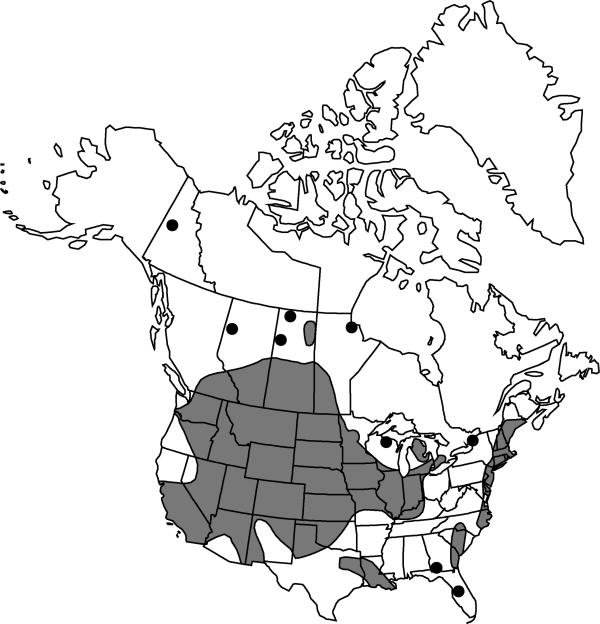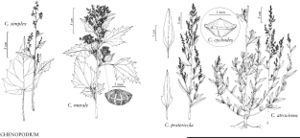Chenopodium pratericola
Bull. Torrey Bot. Club 39: 310. 1912.
Stems strictly erect, simple or branching above, 2–8 dm, moderately to densely farinose. Leaves nonaromatic; petiole 0.4–1 cm; blade linear to narrowly lanceolate, or oblong-elliptic, (1- or)3-veined, 1.5–4.2(–6) × 0.4–1(–1.4) cm, thick and somewhat fleshy, base cuneate, margins entire or with pair of lobes near base, apex acute, abaxial surface densely to sparingly white-mealy. Inflorescences glomerules in terminal and axillary panicles, 1–13 × 0.15–0.5 cm; glomerules usually densely disposed, maturing irregularly; bracts leaflike. Flowers: perianth segments (4–)5, distinct nearly to base; lobes oblong-ovate, 0.8–1 × 0.5–0.7 mm, apex obtuse, rounded or emarginate, strongly keeled along midvein, densely farinose, usually spreading from fruit; stamens (4–)5; stigmas 2, 0.2 mm. Utricles ovoid; pericarp nonadherent, smooth. Seeds round, 0.9–1.3 mm diam., margins rounded; seed coat black, rugulate. 2n = 18.
Phenology: Fruiting early summer–fall.
Habitat: Open sandy soils, pinyon woodlands, sagebrush, often in saline or alkaline habitats
Elevation: 0-2400 m
Distribution

Alta., B.C., Man., N.W.T., Ont., Sask., Yukon, Alaska, Ariz., Calif., Colo., Conn., Idaho, Ill., Ind., Iowa, Kans., Ky., La., Maine, Md., Mass., Minn., Mo., Mont., Nebr., Nev., N.H., N.J., N.Mex., N.Y., N.C., N.Dak., Okla., Oreg., Pa., R.I., S.C., S.Dak., Tex., Utah, Vt., Va., Wash., Wis., Wyo.
Discussion
Selected References
None.
